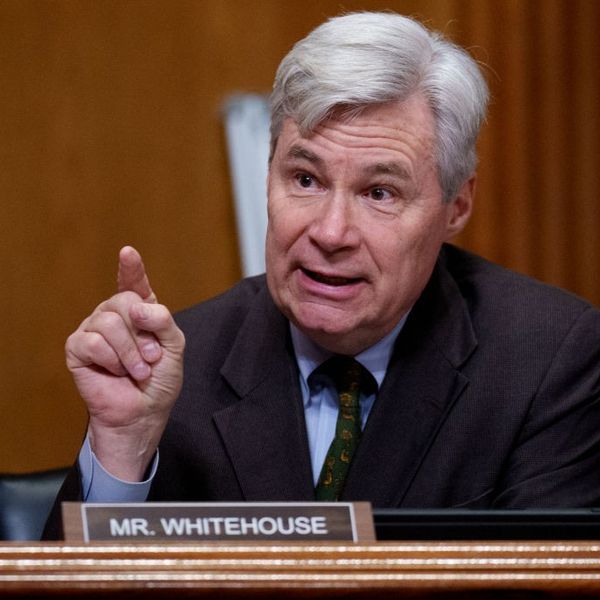
While most of the focus on climate risk disclosure has been on the fossil fuel industry, few sectors face as much risk as food and agriculture--in particular, companies with long supply chains increasingly vulnerable to disruption.(Photo: shutterstock)
Senator Warren's Push for Climate Risk Disclosure
Warren's new bill shines a light on how agribusiness and food companies will have to adapt to new conditions to reduce their risk and transition toward a more resilient, climate-friendly economy
Just prior to the new year, Senator Elizabeth Warren (D-MA) threw her hat into what is expected to be a crowded 2020 presidential race. Senator Warren has been an advocate for climate action, and her lead climate proposal capitalizes on her market regulatory expertise to require new levels of climate risk disclosure by public corporations--including agribusiness firms.
Introduced in September, the Climate Risk Disclosure Act, which also has the support of several other rumored presidential candidates including Cory Booker (D-NJ), Kamala Harris (D-CA), and Kirsten Gillibrand (D-NY), would require public companies to disclose climate related risk to their shareholders. While the Securities and Exchange Commission (SEC) already advises that publicly traded companies disclose climate change risks to investors, companies are not required to report on climate in any standardized way through their SEC filings. Additionally, the SEC has been lax in enforcing climate change disclosures.
The Climate Risk Disclosure Act directs the SEC, in consultation with climate experts at other federal agencies, to issue rules within one year that require every public company to disclose:
- its direct and indirect greenhouse gas emissions;
- the total amount of fossil-fuel related assets that it owns or manages;
- how its valuation would be affected if climate change continues at its current pace or if policymakers successfully restrict greenhouse gases (GHGs) to meet the Paris accord goal;
- and its risk management strategies related to the physical risks and transition risks posed by climate change.
The push for greater climate risk disclosure is gaining support. The global Task Force on Climate-Related Financial Disclosures published guidelines for public corporations and investors in 2017, and last year the task force reported growing momentum in the adoption of the new climate risk disclosure guidelines.
While most of the focus on climate risk disclosure has been on the fossil fuel industry, few sectors face as much risk as food and agriculture--in particular, companies with long supply chains increasingly vulnerable to disruption. The National Climate Assessment published late last year outlined a series of daunting climate-related concerns for agriculture, including "increased rates of crop failure, reduced livestock productivity, and altered rates of pressure from pests, weeds, and diseases."
Last year, we wrote about the climate risk to meat companies in locating large concentrated animal feeding operations (CAFOs) near high-risk hurricane zones. For instance, Smithfield controls hundreds of CAFOs within or near flood plains in North Carolina. Two recent hurricanes have caused the breach of giant hog manure lagoons in the state that have spilled out into nearby waterways.
The meat and fertilizer companies could also face stronger regulations as governments implement policies to reduce two potent GHGs (methane and nitrous oxide) in order to reach their Paris climate goals.
As climate change accelerates, agribusiness and food companies will have to adapt to new conditions to reduce their risk and transition toward a more resilient, climate-friendly economy. Senator Warren's bill shines a much-needed bright light on corporate climate risk that should inform the future priorities of investors.
An Urgent Message From Our Co-Founder
Dear Common Dreams reader, The U.S. is on a fast track to authoritarianism like nothing I've ever seen. Meanwhile, corporate news outlets are utterly capitulating to Trump, twisting their coverage to avoid drawing his ire while lining up to stuff cash in his pockets. That's why I believe that Common Dreams is doing the best and most consequential reporting that we've ever done. Our small but mighty team is a progressive reporting powerhouse, covering the news every day that the corporate media never will. Our mission has always been simple: To inform. To inspire. And to ignite change for the common good. Now here's the key piece that I want all our readers to understand: None of this would be possible without your financial support. That's not just some fundraising cliche. It's the absolute and literal truth. We don't accept corporate advertising and never will. We don't have a paywall because we don't think people should be blocked from critical news based on their ability to pay. Everything we do is funded by the donations of readers like you. Will you donate now to help power the nonprofit, independent reporting of Common Dreams? Thank you for being a vital member of our community. Together, we can keep independent journalism alive when it’s needed most. - Craig Brown, Co-founder |
Just prior to the new year, Senator Elizabeth Warren (D-MA) threw her hat into what is expected to be a crowded 2020 presidential race. Senator Warren has been an advocate for climate action, and her lead climate proposal capitalizes on her market regulatory expertise to require new levels of climate risk disclosure by public corporations--including agribusiness firms.
Introduced in September, the Climate Risk Disclosure Act, which also has the support of several other rumored presidential candidates including Cory Booker (D-NJ), Kamala Harris (D-CA), and Kirsten Gillibrand (D-NY), would require public companies to disclose climate related risk to their shareholders. While the Securities and Exchange Commission (SEC) already advises that publicly traded companies disclose climate change risks to investors, companies are not required to report on climate in any standardized way through their SEC filings. Additionally, the SEC has been lax in enforcing climate change disclosures.
The Climate Risk Disclosure Act directs the SEC, in consultation with climate experts at other federal agencies, to issue rules within one year that require every public company to disclose:
- its direct and indirect greenhouse gas emissions;
- the total amount of fossil-fuel related assets that it owns or manages;
- how its valuation would be affected if climate change continues at its current pace or if policymakers successfully restrict greenhouse gases (GHGs) to meet the Paris accord goal;
- and its risk management strategies related to the physical risks and transition risks posed by climate change.
The push for greater climate risk disclosure is gaining support. The global Task Force on Climate-Related Financial Disclosures published guidelines for public corporations and investors in 2017, and last year the task force reported growing momentum in the adoption of the new climate risk disclosure guidelines.
While most of the focus on climate risk disclosure has been on the fossil fuel industry, few sectors face as much risk as food and agriculture--in particular, companies with long supply chains increasingly vulnerable to disruption. The National Climate Assessment published late last year outlined a series of daunting climate-related concerns for agriculture, including "increased rates of crop failure, reduced livestock productivity, and altered rates of pressure from pests, weeds, and diseases."
Last year, we wrote about the climate risk to meat companies in locating large concentrated animal feeding operations (CAFOs) near high-risk hurricane zones. For instance, Smithfield controls hundreds of CAFOs within or near flood plains in North Carolina. Two recent hurricanes have caused the breach of giant hog manure lagoons in the state that have spilled out into nearby waterways.
The meat and fertilizer companies could also face stronger regulations as governments implement policies to reduce two potent GHGs (methane and nitrous oxide) in order to reach their Paris climate goals.
As climate change accelerates, agribusiness and food companies will have to adapt to new conditions to reduce their risk and transition toward a more resilient, climate-friendly economy. Senator Warren's bill shines a much-needed bright light on corporate climate risk that should inform the future priorities of investors.
Just prior to the new year, Senator Elizabeth Warren (D-MA) threw her hat into what is expected to be a crowded 2020 presidential race. Senator Warren has been an advocate for climate action, and her lead climate proposal capitalizes on her market regulatory expertise to require new levels of climate risk disclosure by public corporations--including agribusiness firms.
Introduced in September, the Climate Risk Disclosure Act, which also has the support of several other rumored presidential candidates including Cory Booker (D-NJ), Kamala Harris (D-CA), and Kirsten Gillibrand (D-NY), would require public companies to disclose climate related risk to their shareholders. While the Securities and Exchange Commission (SEC) already advises that publicly traded companies disclose climate change risks to investors, companies are not required to report on climate in any standardized way through their SEC filings. Additionally, the SEC has been lax in enforcing climate change disclosures.
The Climate Risk Disclosure Act directs the SEC, in consultation with climate experts at other federal agencies, to issue rules within one year that require every public company to disclose:
- its direct and indirect greenhouse gas emissions;
- the total amount of fossil-fuel related assets that it owns or manages;
- how its valuation would be affected if climate change continues at its current pace or if policymakers successfully restrict greenhouse gases (GHGs) to meet the Paris accord goal;
- and its risk management strategies related to the physical risks and transition risks posed by climate change.
The push for greater climate risk disclosure is gaining support. The global Task Force on Climate-Related Financial Disclosures published guidelines for public corporations and investors in 2017, and last year the task force reported growing momentum in the adoption of the new climate risk disclosure guidelines.
While most of the focus on climate risk disclosure has been on the fossil fuel industry, few sectors face as much risk as food and agriculture--in particular, companies with long supply chains increasingly vulnerable to disruption. The National Climate Assessment published late last year outlined a series of daunting climate-related concerns for agriculture, including "increased rates of crop failure, reduced livestock productivity, and altered rates of pressure from pests, weeds, and diseases."
Last year, we wrote about the climate risk to meat companies in locating large concentrated animal feeding operations (CAFOs) near high-risk hurricane zones. For instance, Smithfield controls hundreds of CAFOs within or near flood plains in North Carolina. Two recent hurricanes have caused the breach of giant hog manure lagoons in the state that have spilled out into nearby waterways.
The meat and fertilizer companies could also face stronger regulations as governments implement policies to reduce two potent GHGs (methane and nitrous oxide) in order to reach their Paris climate goals.
As climate change accelerates, agribusiness and food companies will have to adapt to new conditions to reduce their risk and transition toward a more resilient, climate-friendly economy. Senator Warren's bill shines a much-needed bright light on corporate climate risk that should inform the future priorities of investors.

